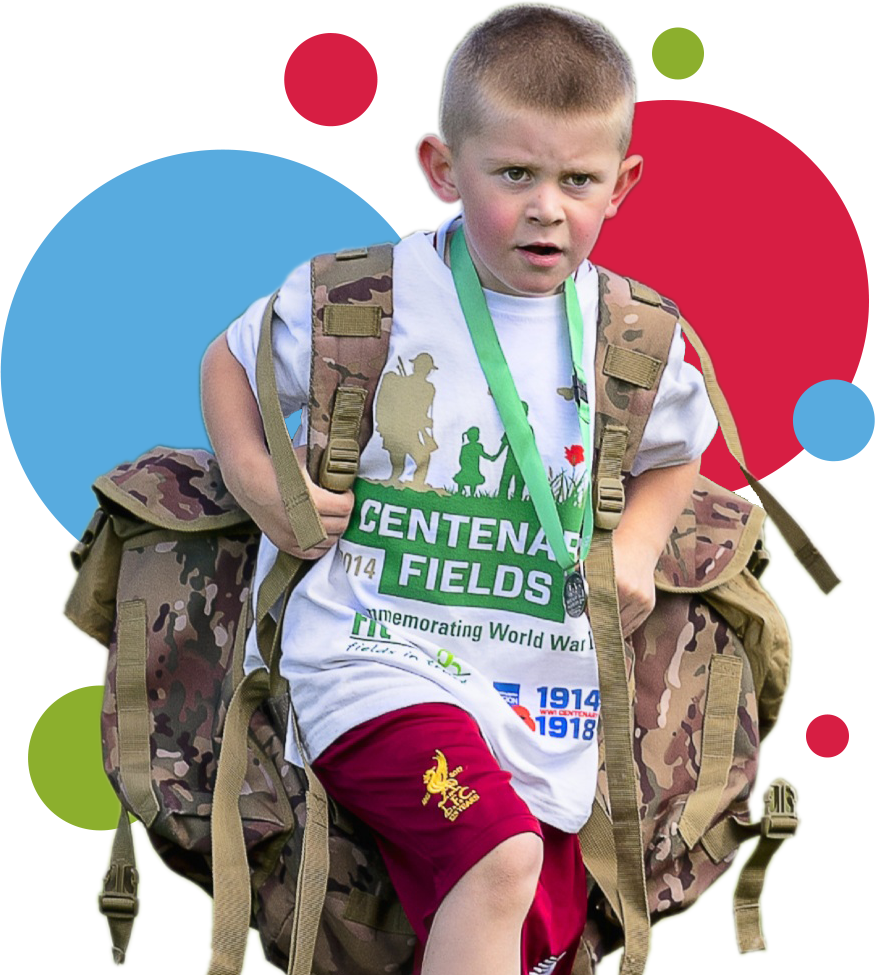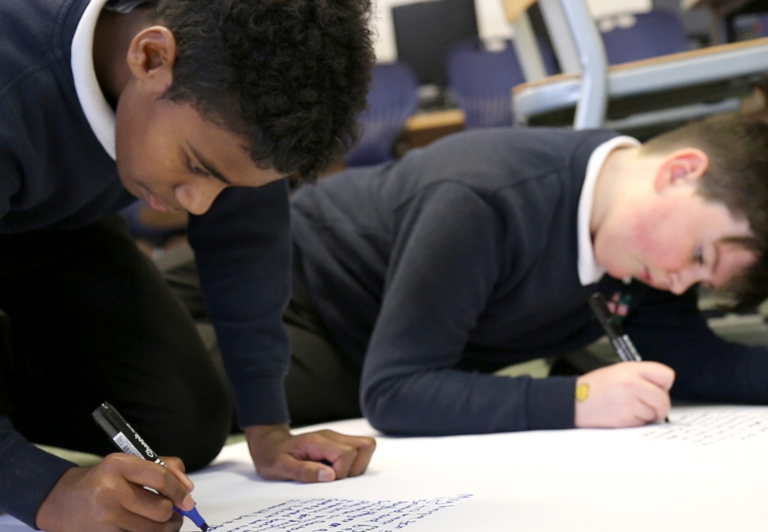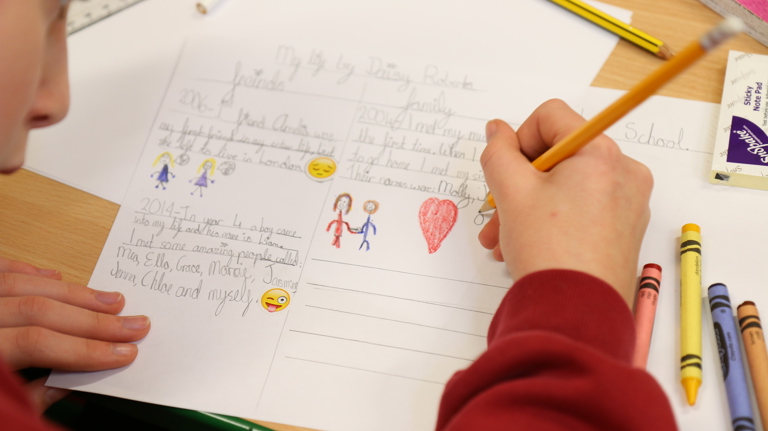Beth yw Rheoli Achos?
Mae cefnogaeth Rheoli Achos ar gael i ysgolion sydd ag un plentyn y Lluoedd Arfog neu nifer fach iawn o Blant y Lluoedd Arfog ag angen penodol sy’n ymwneud ag effaith ffordd o fyw y Lluoedd Arfog. Mae Rheoli Achos yn ymyrraeth tymor byr, sy’n cael ei reoli gan dîm SSCE Cymru drwy weithio gydag ysgolion ac awdurdodau lleol i nodi cefnogaeth a ellid ei defnyddio i oresgyn heriau y mae’r plentyn unigol neu grwpiau bychan o Blant y Lluoedd Arfog yn eu hwynebu.
Mae Rheoli Achos ar gael i ysgolion sydd â Phlentyn/Plant y Lluoedd Arfog sy’n dod dan y diffiniad hwn gan Lywodraeth Cymru:
Diffiniad Llywodraeth Cymru o blentyn y Lluoedd Arfog:
Mae gan 'blentyn y Lluoedd Arfog' riant (rhieni) neu unigolyn (unigolion) gyda chyfrifoldeb rhiant gweithredol sydd yn bersonél y Lluoedd Arfog sy'n gwasanaethu:
Cysylltwch â SSCECymru@wlga.gov.uk os oes gennych blentyn/plant y Lluoedd Arfog nad ydynt yn dod dan y diffiniad hwn.

Gall ffordd o fyw'r Lluoedd Arfog gael effaith academaidd, cymdeithasol ac emosiynol ar blant. Ymhlith eraill, mae’r profiadau hyn yn cynnwys symud, gwahanu, rhieni ar gyfnod gwasanaeth neu bontio. Gallai problemau godi fydd angen cefnogaeth y tu hwnt i gapasiti’r ysgol a/neu’r awdurdod lleol. Gweler enghreifftiau o Reoli Achos isod.

Bydd SSCE Cymru yn rheoli’r gefnogaeth hon - drwy gydlynu ymyraethau, monitro cynnydd a mesur effaith gyda phob ysgol. Mae’n bosibl y bydd SSCE Cymru yn gallu cael gafael ar gyllid i gefnogi’r ymyraethau hyn pan fo angen. Mae’r gefnogaeth Rheoli Achos gan SSCE Cymru ar gael i ysgolion ei ddefnyddio drwy gydol y flwyddyn.

Os oes gan eich ysgol blentyn unigol neu nifer fechan iawn o blant y Lluoedd Arfog a allai fod angen y gefnogaeth hon, cysylltwch â SSCECymru@wlga.gov.uk i drafod y broses Rheoli Achos ymhellach.
Gweler hefyd ein Canllawiau ar Reoli Achos i Ysgolion isod am ragor o wybodaeth am y broses Rheoli Achos.

Cefndir Plentyn y Lluoedd Arfog: Brawd neu chwaer yn profi effaith PTSD; effaith emosiynol profi effeithiau PTSD ar y rhiant ac effaith hyn ar y ffordd mae’r rhiant yn ymgysylltu â’r disgybl a’i gefnogi’n addysgol. Mae hyn yn golygu fod y disgyblion yn cael anawsterau cael mynediad at addysg.
Dyfarnwyd: £720
Ymyrraeth: Rhyddhau aelod o staff i ddarparu amrywiaeth o raglenni cefnogi’n targedu llythrennedd, rhifedd, hyder a lles emosiynol.
Effaith: Mae’r ddau blentyn wedi elwa’n academaidd ac yn gymdeithasol o’r gefnogaeth a gawsant. Mae’r plant wedi teimlo’n ddiogel a bod ganddynt oedolyn y gallant ymddiried ynddynt i siarad â nhw yn yr ysgol. Maen
Cefndir Plentyn y Lluoedd Arfog: Anawsterau ymlyniad a rheoli emosiynau’n ymwneud â chael ei wahanu oddi wrth rieni sy’n gwasanaethu. Cyn dechrau'r ymyrraeth, nid oedd y plentyn yn gallu rheoli ei emosiynau, yn enwedig ar ôl cael ei ddanfon i’r ysgol a gwahanu ac yn ystod amseroedd o newid. Byddai hyn yn arwain at byliau ymosodol ac yna teimladau o gywilydd a hwyliau gwael.
Dyfarnwyd: £420
Ymyrraeth: Rhyddhau aelod o staff y mae gan y disgybl berthynas dda â nhw ac sydd wedi hyfforddi mewn ELSA, i ddarparu ymyrraeth llythrennedd emosiynol a chwarae cadarnhaol i gefnogi lles emosiynol, cymdeithasol a meddyliol a datblygu strategaethau i helpu i’w rheoli.
Effaith: Rhoddodd y sesiynau llythrennedd emosiynol gyfle i drafod teimladau, emosiynau, strategaethau i ddelio â dicter a datblygu hunan-barch y disgybl. Daeth yn haws nodi sbardunau posibl a rhoi cefnogaeth ar waith cyn i unrhyw beth ddigwydd. Mae gan y disgybl strategaethau cadarnhaol ar waith.
Cefndir Plentyn y Lluoedd Arfog: Wedi profi llawer iawn o symud, mae’n ddisgybl Saesneg fel Iaith Ychwanegol ac wedi ymuno â’r ysgol yn ystod y cyfnod clo. Cyn dechrau’r ymyrraeth, roedd y disgybl yn hynod o swil, roedd yn anghyfforddus wrth gyfathrebu â’i gyfoedion ac athrawon, ac roedd wedi ymddieithrio rhag y mwyafrif o wersi yn yr ysgol.
Dyfarnwyd: £500
Ymyrraeth: Rhyddhau aelod o staff roedd y disgybl wedi ffurfio perthynas gadarnhaol â nhw, i ddarparu ymyriadau â’r nod o wella hyder, sgiliau cyfathrebu a lles y disgybl yn yr ysgol.
Effaith: Ar ôl sawl wythnos o gefnogaeth, roedd yn amlwg bod y disgybl yn ymgysylltu fwy â dysgu a’i gyfoedion, ac wedi meithrin hyder i gymryd rhan mewn gwers addysg gorfforol am y tro cyntaf ers dod i’r ysgol.
Cefndir Plentyn y Lluoedd Arfog: Wedi i’w dad adael ar gyfnod gwasanaeth, roedd y plentyn yn cael anawsterau ymlyniad ac yn cael trafferth rheoli ei emosiynau.
Dyfarnwyd: £750
Ymyrraeth: Rhyddhau aelod o staff i gynnal sesiynau llythrennedd emosiynol i gefnogi’r disgybl.
Effaith: Llwyddodd y disgybl i feithrin perthynas lwyddiannus â’r aelod o staff fel bod ganddo rywun i fynd atynt i gael cefnogaeth yn yr ysgol. Nodwyd strategaethau i’w gefnogi i reoli emosiynau a chyfathrebu â’r rhiant sy’n gwasanaethu.

It's ok talking over skype and that but sometimes you just want a hug when Dad is away.


"Gynted ag ydych yn dod i arfer i dŷ, rydych yn cael eich symud – rwyf wedi bod mewn pedair ysgol ac wedi symud chwech gwaith."
Aiden

"Roeddwn i’n byw yn Nepal, yna aethom i Brunei, yna Malaysia."
Ashim

"Drwy fy llygaid i mae gennych gannoedd o ffrindiau mewn llefydd gwahanol."
Chloe

"Dwi di arfer symud rŵan a chymysgu gyda’r plant... Dwi di neud o gymaint o weithiau mae’n rhywbeth arferol rŵan."
Chloe
Designed & built by eInfinity Limited. Hosting & IT management at eInfinity Tech.